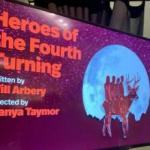 Earlier this week, I ran across a particularly good column in The Week, penned by the eternally curmudgeonly Catholic writer Matthew Walther. Walther begins by pointing out the obvious: despite the insane amounts of money and time, and the endless iterations of “educational theory,” deployed to address America’s reading crisis, the investments don’t seem to be paying off. Students are less and less interested in reading books that demand something of them, and more and more interested in ubiquitous electronic entertainment.
Earlier this week, I ran across a particularly good column in The Week, penned by the eternally curmudgeonly Catholic writer Matthew Walther. Walther begins by pointing out the obvious: despite the insane amounts of money and time, and the endless iterations of “educational theory,” deployed to address America’s reading crisis, the investments don’t seem to be paying off. Students are less and less interested in reading books that demand something of them, and more and more interested in ubiquitous electronic entertainment.
Walther also points out that most literature classes treat their subject matter with a kind of bland didacticism. Everything needs to have a simple, easily digestible message: Ralph Ellison’s Invisible Man is “that book about racism”; William Golding’s Lord of the Flies is “that book about the breakdown of civilization”; Mary Shelley’s Frankenstein is “that book about social alienation.” And so on and on it goes. (Things are even worse when it comes to poetry. AP English is all about the abolition of rhetorical ambiguity and beauty.)
To be sure, I agree with all of Walther’s points. But I think it’s worth extending that argument even further: Kids in schools spend a lot of time reading bad books. And by “bad books” I don’t mean offensive books—I mean poor-quality, uninspiring texts that someone has decided are “age-appropriate” for particular audiences.
First on the chopping block are facile “readers” that attempt to teach reading through simple stories about everyday experiences. I can still remember the stuff we were handed in first grade—Fun With Pets was a particularly insipid volume. Slightly older students are treated to an endless procession of dull chapter books describing some aspect of American or world history (flip through a recent Scholastic Books catalog if you want to see what I mean). Usually these stories end up being framed in a quasi-Hegelian way: history, at bottom, is the eternal movement of progress towards freedom and enlightenment. Every upheaval—every conflict between the wise, forward-thinking protagonists and the intransigent antagonists—needs to have a happy ending.
But, quite simply, this isn’t how good literature operates.
The books I loved most when I was young were the Great Illustrated Classics volumes—highly abridged versions of stories like Moby-Dick, The Count of Monte Cristo, Great Expectations, and countless others (books that certainly don’t have happy endings in the traditional sense). Notwithstanding the simplified prose, these adaptations did nothing to blunt the narrative force of the original tales. I can never shake the haunting image of Edmond Dantes’s departure on a solo voyage, following his revenge on his adversaries, with the cryptic words “wait and hope.” Nor can I lose the ghoulish vision of Melville’s mystic Fedallah, crucified by a tangle of harpoons on the back of the white whale, or forget Miss Havisham’s cobwebbed wedding cake.
The point here isn’t the macabre in its own right, but what it represents: Dantes forces us to ask whether single-minded devotion to vengeance renders one unfit for society; Fedallah makes us question whether we would recognize a prophet if one appeared among us; Miss Havisham reflects an obsessive devotion to the past; and so forth. Whether I could articulate these themes and motifs at the time is beside the point; what matters is that they’re part of me now, constituents of the lenses through which I see the world. And they’re so deeply engrained because they were introduced early on. If I’d been given a steady diet of “safe” kids’ books, I’d never have grown to love reading.
This is also one reason I’ve never been particularly sympathetic to the argument—popular in “post-evangelical” circles—that the Bible needs to be sanitized for children, or (pace Richard Dawkins) that talk of hell and judgment is some kind of child abuse. Of course the Bible is full of violence, warfare, and high-stakes existential questions. Life is full of those things. And deep down, young people know when they’re being kept in a bubble. (It only takes one viewing of The Lion King, Charlotte’s Web, or The Land Before Time for a child to grasp that death comes for us all.) Reading good books, from an early age, teaches us that there is meaning in and through the forms of darkness we experience.
All that to say: any school (or society) that wants kids to be good readers—and, more importantly, to love reading—needs to give them a reason. And fortunately, there are plenty of good stories out there just waiting to be engaged. It’s high time to be bold and give kids the benefit of the doubt; still waters, after all, really do run deep.












